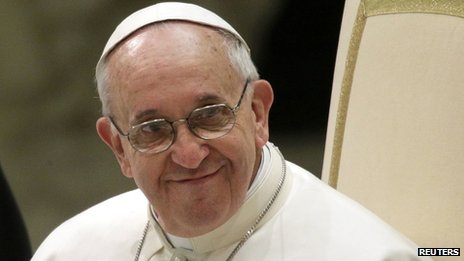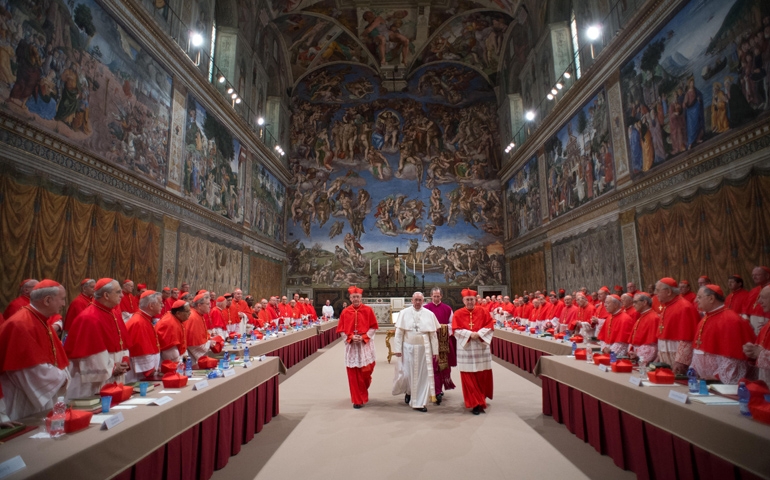Some moments in history seem very significant while we are passing through them. Time will really tell. 9/11 was such a moment for Americans. We who were alive that day will never forget. Last week, at least to me, felt like such a moment, but in a much less shocking and jarring way. I believe significant history was made in Rome by the choice of a new pope who took the name Francis.
Critics will have their day. History will tell the real story, at least long after we are all gone. Such critics have already surfaced from the left and the right. These critics are Catholics, and of course, some are Protestants. (One evangelical critic appears to be theologian Roger Olson who asked “Who Cares” if we have a pope? I posted a response on his site over the weekend if you’d like to see my comment.) The largest majority of these critics have been secularists who do not like much anything that reminds them of the Christian church in the modern world.
I write these blogs not as a critic of the new pope. Nor do I write as a scholar of the Vatican. I write from my own perspective as an evangelical Reformed Church minister who is deeply committed to missional-ecumenism and the importance of serving the poor as a primary response to the teaching of our Lord Jesus Christ. And I also write as a “bridge builder,” not as a polemicist. I will leave to others debates about the papacy as a doctrine and institution. I am, quite obviously, not a Catholic apologist for the place of the papacy in Christ’s church. I do not accept the doctrine of the papacy or the claims made for its direct connection with the Apostle Peter. Having expressed my own perspective, and obvious bias, I write first as a Christian and second as a missional-ecumenist. Finally, I write as a “friend” to my Catholic brothers and sisters who love Christ and his kingdom along with me.
The Choice of Pope Francis
Pope Francis is the first pope from the new world. He plainly faces a mountain of problems inside the Vatican. How will he address the moral issues that call the church to a renewal of holiness in her corporate life? How will he address the issues raised by the Vatican Bank, a bank that I wish the church would dissolve sooner than later? And how will he handle the extremely controversial issues that divide Catholic progressives from Catholic traditionalists? He surely needs the prayers of all of Christ’s flock to have the strength, wisdom and courage to lead the world’s largest Christian church. I have begun to offer prayers for Pope Francis and will continue to pray for him as my brother.
Pope Francis seems to appeal to both Catholic conservatives and reformers, being seen as orthodox on sexual matters, to cite just one important instance, but liberal on social justice, though he is quite far from being a “liberation theologian.”

Profound Change
Make no mistake about it, profound change took place this past week in Rome. The papacy, whether you believe it has biblical warrant or not, has survived trials beyond belief. But Francis is, as TIME says, “the first New World Pope.” As such we have seen two immense changes inside the Vatican in less than a month. First, a living pope resigned/retired without scandal, pressure or political intrigue. Benedict XVI, like him or not, demonstrated amazing humility by stepping down when he personally concluded that he could not lead the church fully in the coming months. This was the first such decision by a pope in over 600 years. It is a decision that alters how the papacy will be seen for decades, if not for centuries to come. Second, a pope who is not from Europe will now lead a church of 1.2 billion members. This church, and this pope, will profoundly influence politics, missions, efforts like those I am involved in where Christian leaders are working for greater Christian unity, and the well-being of millions of poor people in every region of the world.
A Divided Church
The Catholic church can rightly claim that it is one church but the claim is also highly questionable in the face of such incredible diversity. In Protestantism, and especially in evangelical Protestantism, we have (for example) growing divisions within our communities over some of the very same issues that divide Catholics. Take one example– the Anglican Church in America and Canada. Here you see the pressures of modernity upon a historic confessional church directly undermining the unity of the faith. Some conservative Catholic apologists seem to enjoy arguing that this schism proves we are not a part of the “true” church of Jesus Christ. But more humble and wise Catholics know better. The Catholic Church may have one sacramental table, built around their idea of one (unique) priesthood, but it is not one in terms of deep relational love and common mission. The Catholic Church is diverse and divided by serious debates. These debates defy logic when apologists speak of oneness in the real world sense that most people mean when they use that word one. I admire the oneness of Catholic table fellowship and do not wish to belittle this in the least. But we must be serious about oneness–this new pope faces a fractured and troubled church in an increasingly complex “flat” world. The church may be sacramentally one but it is torn and losing ground, especially in the West. In Argentina, where the new pope was an archbishop until last week, the Catholic Church is becoming less and less important in a modern secular society that looks more and more like their neighbors in North America. Progressive and conservative Catholics have been involved in tense struggles in Argentina for several decades now.
TIME is right to note that many Catholics in Europe and North America are seeking a more-liberal interpretation of doctrine while Catholics in the places where the church is exploding in growth, such as Africa and Asia, long for a more traditional and conservative expression of the faith. TIME is also right: “Unlike some of the cataclysmic challenges in the church’s past, these problems are internal–but as such, they are more difficult to solve.” The Catholic Church is one communion in terms of the relationship of the baptized to the Mass, and thus to their priesthood. It is anything but one when it comes to love, familial concern and deeply experienced, transcendent oneness that leads to passionate mission for Christ.
The Last Conclave
We now know, by the stories that have slipped out over time, that eight years ago Cardinal Bergoglio almost made history when he was the only real challenger to Joseph Ratzinger. Ratzinger became the second consecutive non-Italian to become pope, itself an amazing new reality.
Bergoglio is the son of Italian immigrants thus one can say he came full circle, bringing the papacy back to his parent’s homeland. But Bergoglio was hardly mentioned by the “handicappers” who wrote about their favorites going into the conclave. (I confess I find this handicapping talk understandable among the non-religious but immodest when it comes from devout Catholics!) What is true, is that these predictions could not have been more wrong last week. (John L. Allen, Jr. did list Bergoglio in his articles about 20 possible choices but even the extremely astute Allen listed him as a C-list candidate, mostly because of his age and the fact that he had been passed over in a previous conclave.)
David Gibson, a Catholic reporter who also covered the conclave, reported on March 16:
On the night of March 10, Fr. Thomas Rosica was walking through the Piazza Navona in Rome’s historic center when he bumped into Cardinal Jorge Mario Bergoglio, whom he has known for years. Bergoglio was walking alone, wearing a simple black cassock, and he stopped and grabbed Rosica’s hands.
“I want you to pray for me,” the Argentine cardinal told Rosica, a Canadian priest who was assisting as a Vatican spokesman during the papal interregnum. Rosica asked him if he was nervous. “A little bit,” Bergoglio said.
He had reason to be worried. Two days later, on Tuesday evening, he and 114 other cardinals entered the conclave to elect a successor to Benedict XVI; a little more than 24 hours and five ballots after that, Bergoglio emerged on the balcony of St. Peter’s Basilica as Pope Francis.
It was a surprising outcome. Even if Bergoglio suspected something was up, few of the cardinals inside the Sistine Chapel seemed to have entered their private meeting with him as a prominent candidate in their minds and hearts. This makes me think the Holy Spirit was gently moving through the room as the 115 cardinals met, prayed and voted over a period of less than two days. I find this conclusion delightfully biblical and genuinely encouraging.
Related Posts
Comments
Comments are closed.
My Latest Book!

Use Promo code UNITY for 40% discount!







Barry Grecu liked this on Facebook.
Ben Toh liked this on Facebook.
Dennis K Massaro liked this on Facebook.
Ed Holm liked this on Facebook.
This is great John!
Beautiful and hopeful!!!
Roger LeBlanc liked this on Facebook.
John, I appreciate your thoughtful remarks. As someone who has a deep regard for true brothers and sisters in Christ, regardless of their particular brand of fellowship, I value your knowledgeable evaluation of what took place in Rome recently. Truly, we need to keep praying for the new leader of the Catholic church just as we need to pray for our global political leaders, such as our president. But Pope Francis carries a lot more potential to influence the world for good, and a lot more burden of manifesting the life and love of Christ in a very fallen world. He is impressive as someone who cares about the poor, doesn’t seem to think more highly of himself than he ought to, and relishes prayer with people like Luis Palau as well as his fellow Catholic leaders. Of course, time will tell, but perhaps the Lord God is about to reshape history, in part, through the agency of Pope Francis. Truly, praying for him at this crucial time would be a very valuable investment.
Joseph Chon liked this on Facebook.
Wonderfully stated, John. Very helpful insights and dimensions of this most evidently humble servant of Jesus Christ as his Lord. What encouragement all this brings to anticipate a broad modeling of the simple Gospel, “the power of God unto Salvation, for all who believe,” and the teaching of same into 1.2 billion professing believers. Pray for Francis I? Indeed!
John, I’m glad that you challenged Roger Olson over what he wrote. I have been greatly edified by his writings and pushing back as you did is a sign that we care.
I also have a good feeling about this pope. He has a sense of humor. When he was elected, one of the first things that he said to his fellow cardinals was, “May God forgive you for what you have done.”
http://www.nypost.com/p/news/international/father_forgive_them_7g9eZeF8N5Enl8Y1pQgz4L